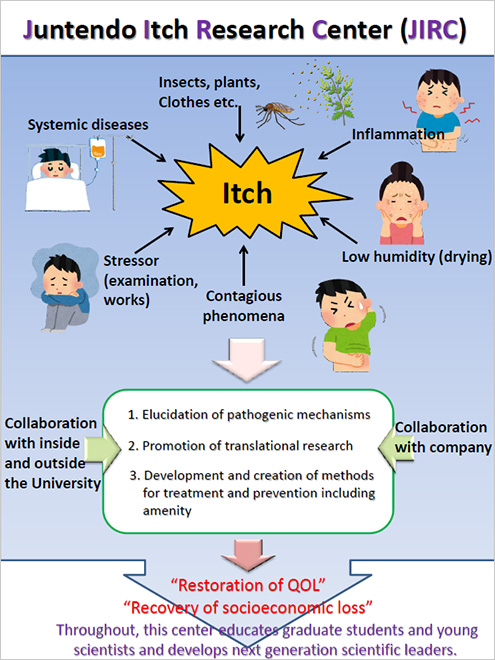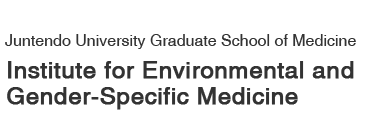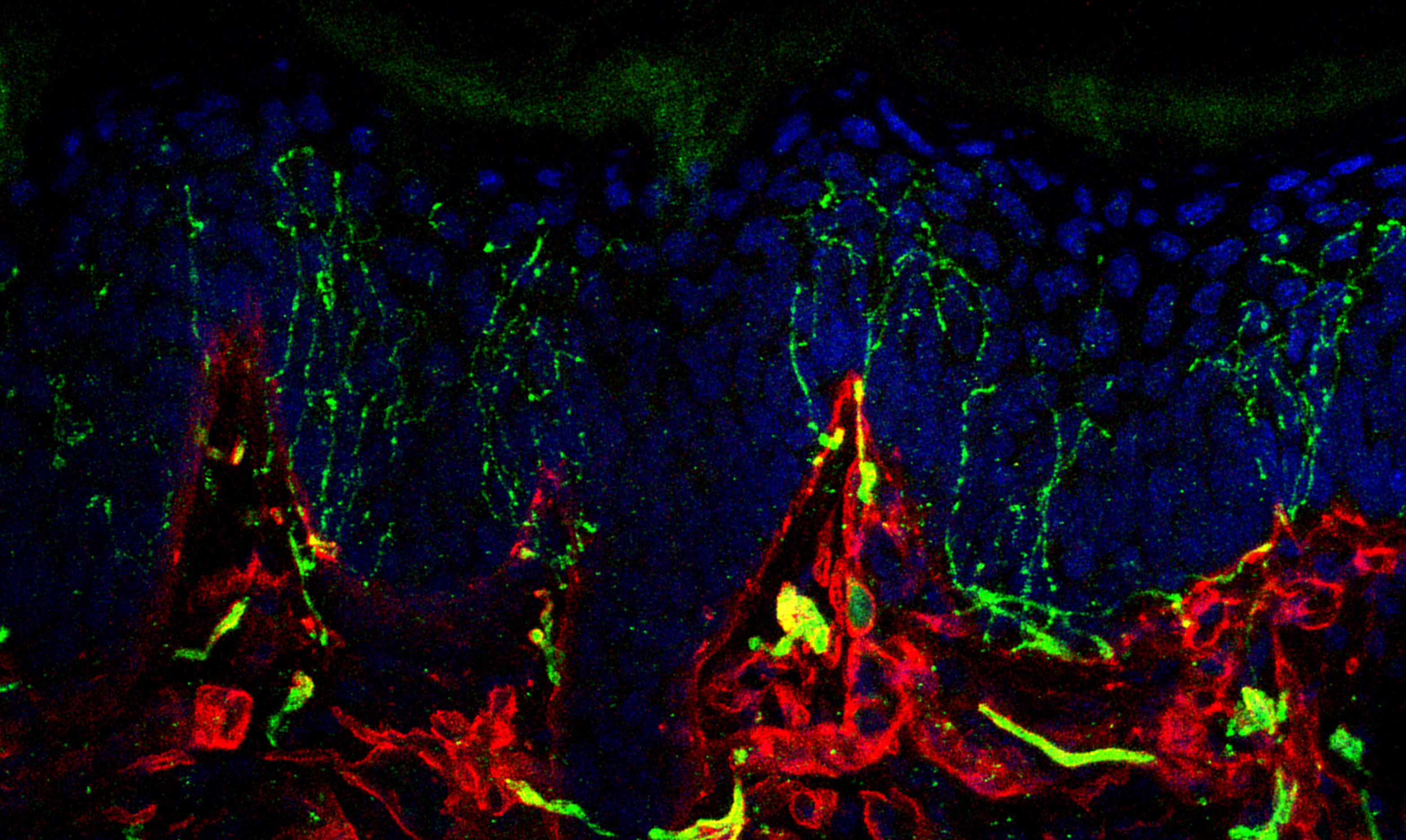Overview
【Background】
About Itch
Itch (or pruritus) is defined as an unpleasant sensation with the urge to scratch, which is believed to be a biological self-defense reaction to external assault or a physiological warning of abnormality inside the body. Moreover, continuous itch stimuli could modify the itch sensation, leading to treatment resistance and chronicity. Itch resistance to antihistamines, which are traditional antipruritic medicines, is an example of intractable itch.
Intractable itch causes sleep disturbance and psychological stress (depression, anxiety, and even suicidal feelings), which lead to poor performance in school or at work and reduce the quality of life (QOL). Such reduction of QOL diminishes motivation to pursue an industrious life and social activities, affecting socioeconomic activity.
In Europe and the USA, based on this background, several itch research centers were established and began to focus on revealing the mechanism of intractable itch, aiming for its prevention and treatment.
About The Institute for Environmental and Gender-Specific Medicine
The Institute for Environmental and Gender-Specific Medicine, Juntendo University Graduate School of Medicine (the founding director; CEO Hideoki Ogawa, M.D., Ph.D.), was founded in 2002, supported by a grant of High-Tech Research Center Project for Private Universities: matching fund subsidy from the Ministry of Education, Culture, Sports, Science and Technology (MEXT) of Japan.
Currently, Prof. Kenji Takamori (M.D., Ph.D.), a director of Institute for Environmental and Gender Specific Medicine in Juntendo University, has been working on the themes, 1) elucidation of pathogenic mechanisms of allergic diseases, autoimmune diseases and cancer, in which environmental and genetic factors are intricately intertwined, and 2) improvement of QOL in patients with those diseases.
Since 2013, Prof. Takamori and collaborators have been focusing on intractable itch helped by Strategic Research Foundation Grant-aided Project for Private Universities from MEXT (Grant number S1311011). So far, we have discovered some neural cells or mediators involved in the pathogenic process of diseases with intractable itch, which should be targets for therapeutic strategies.
About Juntendo Itch Research Center (JIRC)
To promote continued research in this field beyond the above-mentioned support, we established Juntendo Itch Research Center (JIRC) on the 1st of August, 2019, which is a center associated with Juntendo University Graduate School of Medicine, Institute for Environmental and Gender-Specific Medicine.
In this research center, building on the basis of our previous findings, we are aiming to elucidate the molecular and cellular basis of intractable itch and develop medical care including an evaluation system, while supporting young researchers and graduate students in both basic science and clinical fields. This project expects to establish a framework of translational research to develop new treatments for intractable itch, improving QOL and socioeconomic activity.
【Aim and Scope】
Itch (or pruritus) is an unpleasant sensation that evokes the desire to scratch. Itch is believed to signal danger from various environmental factors or physiological abnormalities. Clinically, intractable itch is a burdensome symptom, frequently accompanying a variety of inflammatory skin conditions and systemic diseases, that decreases QOL.
In some cases, the impact on QOL by severe itch is worse than that by pain. In addition, decline in QOL leads to socioeconomic loss due to reduced productivity.
Development of antipruritic treatments requires an understanding of the fundamental mechanisms of itch. Success in these pursuits will bring “restoration of QOL” and “recovery of socioeconomic loss”.
【Name of center】
Juntendo Itch Research Center (JIRC)
【Theme of research】
- Elucidation of the pathogenic mechanism of intractable itch
- Development of preventive and therapeutic methods in intractable itch
【Characteristics】
- Education of graduate students and young scientists including a medical aspect
- Training of next generation scientific leaders
- Provision of excellent equipment and facility for research
- Efficiency of research development by sharing knowledge and technics with collaborators inside and outside the university among involved companies
- Promotion of translational research

Organization
| Director | Kenji Takamori, M.D., Ph.D. ( Director/Specially Appointed Professor, Institute for Environmental and Gender-Specific Medicine ) |
| Vice Director/Core leader ( Neuroscience group ) |
Mitsutoshi Tominaga, Ph.D. ( Associate Professor, Institute for Environmental and Gender-Specific Medicine ) |
| Core leader ( Dermatological science group ) |
Yayoi Kamata, Ph.D. ( Associate Professor, Institute for Environmental and Gender-Specific Medicine ) |
| Core leader ( Immunological science group ) |
Catharina Sagita Moniaga, M.D., Ph.D. ( Cooperative researcher, Institute for Environmental and Gender-Specific Medicine ) |
| Core leader ( Stress group ) |
Soichiro Yoshikawa, Ph.D. ( Associate Professor, Institute for Environmental and Gender-Specific Medicine ) |
| Secretariat | Institute for Environmental and Gender-Specific Medicine |
Members of JIRC
| Eriko Komiya, Ph.D. | Associate Professor, Institute for Environmental and Gender-Specific
Medicine ( Keywords: Neuroscience, psoriasis, alloknesis ) |
| Miho Shiratori, Ph.D. | Associate Professor, Institute for Environmental and Gender-Specific
Medicine ( Keywords: Neuroscience ) |
| Sumika Toyama, Ph.D. | Assistant Professor, Institute for Environmental and Gender-Specific
Medicine ( Keywords: Immunology, eosinophils, iPS cells ) |
| Kotaro Honda, Ph.D. | Adjunct Assistant Professor, Institute for Environmental and Gender-Specific
Medicine ( Keywords: Neuroscience, electrophysiology ) |
| Qiaofeng Zhao, M.D., Ph.D. | Postdoctoral Fellow, Institute for Environmental and Gender-Specific
Medicine ( Keywords: Dermatology, stress, Aging ) |
| Tomohiro Tobita, Ph.D. | Postdoctoral Fellow, Institute for Environmental and Gender-Specific
Medicine ( Keywords: Genetic engineering, genome editing, Sensitization ) |
| Motoki Morita, Ph.D. | Postdoctoral Fellow, Institute for Environmental and Gender-Specific
Medicine ( Keywords: Neuroscience) |
| Kei Nagao Ph.D. | Postdoctoral Fellow, Institute for Environmental and Gender-Specific
Medicine ( Keywords: Stress ) |
| Masaru Uto, M.D. | Graduate student (Doctor’s course), Institute for Environment and
Gender-Specific Medicine ( Keywords: Dermatology ) |
| Yuki Tanaka, M.D. | Graduate student (Doctor’s course), Institute for
Environment and Gender-Specific Medicine ( Keywords: Dermatology ) |
| Zuo Ying, M.D. | Graduate student (Doctor’s course), Institute for
Environment and Gender-Specific Medicine ( Keywords: Dermatology, Stress ) |
| Nozomu Suga, M.D. | Graduate student (Doctor’s course), Institute for
Environment and Gender-Specific Medicine ( Keywords: Dermatology ) |
| Nanami Tanemoto | Graduate student (Master’s course), Institute for
Environment and Gender-Specific Medicine ( Keywords: Dermatology, Nutritional science ) |
| Mao Hotta | Graduate student (Master’s course), Institute for
Environment and Gender-Specific Medicine ( Keywords: Dermatology ) |
| Ryoma Kishi, M.D., Ph.D. | Assistant Professor, Department of Dermatology, Juntendo University Urayasu
Hospital
( Keywords: Dermatology, atopic dermatitis, biologics ) |
| Rui Katoh, M.D., Ph.D. | Assistant Professor, Department of Dermatology, Juntendo University Urayasu
Hospital
( Keywords: Dermatology, molecular target drug ) |
| Go Kojima, M.D., Ph.D. | Assistant Professor, Department of Dermatology, Juntendo University Urayasu
Hospital
( Keywords: Dermatology ) |
| Yui Toyosawa, M.D., Ph.D. | Assistant Professor, Department of Dermatology, Juntendo University Urayasu
Hospital
( Keywords: Dermatology ) |
| Utako Kimura, M.D., Ph.D. | Adjunct Assistant Professor, Department of Dermatology, Juntendo University
Hospital ( Keywords: Dermatology, laser therapy ) |
| Shiho Iwamoto, M.D., Ph.D. | Adjunct Assistant Professor, Department of Gastroenterology, Juntendo
University Hospital ( Keywords: Gastroenterology, inflammatory bowel disease ) |
| Yuko Kurosaki, M.D., Ph.D. | Adjunct Assistant Professor, Department of Dermatology, Juntendo University Urayasu
Hospital ( Keywords: Dermatology, atopic dermatitis, phototherapy ) |
| Munehiro Tsurumachi, M.D., Ph.D. | Adjunct Assistant Professor, Department of Dermatology, Juntendo University
Hospital
( Keywords: Dermatology, atopic dermatitis, aged skin ) |
| Mayu Kawamura, M.D., Ph.D. | Adjunct Assistant Professor, Department of Dermatology, Juntendo University Urayasu
Hospital
( Keywords: Dermatology, chronic itch ) |
| Atsuko Kamo, Ph.D. | Associate Professor, Juntendo University School of Health Care and
Nursing ( Keywords: Dermatology, Nursing, dry skin ) |
Collaborators
【Inside the University】
| Takehiko Yokomizo, M.D., Ph.D. | Prof. Dept. of Molecular and Cellular Biochemistry |
| Takashi Sakurai, M.D., Ph.D. | Prof. Dept. of Cellular and Molecular Pharmacology |
| Chikao Morimoto, M.D., Ph.D. | Specially Appointed Prof. Dept. of Therapy Development and Innovation for Immune disorders and Cancers |
| Nobuyuki Ebihara, M.D., Ph.D. | Prof. Department of Ophthalmology Vice Director, Institute for Environmental and Gender-Specific Medicine |
| Yasushi Suga, M.D., Ph.D. | Prof. Dept. of Dermatology and Allergology |
| Koichiro Ichimura, M.D., Ph.D. | Prof. Department of Anatomy and Life Structure |
| Hiroo Wada, M.D., Ph.D. | Prof. Department of Public Health |
| Francois Niyonsaba, M.D., Ph.D. | Prof. Juntendo University Faculty of International Liberal Arts Prof. Atopy Research Center |
| Toshiro Takai, Ph.D. | Prof. Atopy Research Center |
【Outside the University】
| Ryusuke Kakigi, M.D., Ph.D. | Emeritus Prof. National Institute for Physiological Sciences |
| Makoto Tsuda, Ph.D. | Prof. Dept. of Molecular and System Pharmacology, Grad. Sch. of Pharmaceutical Sciences, Kyushu University |
| Makoto Tominaga, M.D., Ph.D. | Spacially Appointed Prof. Thermal Biology Research Group, Nagoya Advanced Research and Development Center, Nagoya City University |
| Hiroshi Matsuda, D.V.M., Ph.D. | Spacially Appointed Prof. Inst. of Agriculture, Tokyo Univ. of Agriculture and Technology |
| Kenji Izuhara, M.D., Ph.D. | Spacially Appointed Prof. Div. of Medical Biochemistry, Dept. of Biomolecular Sciences, Saga Medical School |
| Yasuyuki Igarashi, Ph.D. | Emeritus Prof. Dept. of Biomembrane and Biofunctional Chemistry, Grad. Sch. of Pharmaceutical Sciences, Hokkaido University |
| Yoshinoiri Fukui, M.D., Ph.D. | University Prof. Kyushu University Institute for Advanced Study |
| Yozo Ishiuji, M.D., Ph.D. | Department of Dermatology, The Jikei University School of Medicine |
Collaboration with Company
| Eternam Co.,Ltd. | Ominedo Pharmaceutical Industry Co., Ltd. |
| Kirin HD/FANCL Corporation. | Kao Corporation. |
| Nippon Zoki Pharmaceutical Co., Ltd. | D&Fproject Co., Ltd. |
| TIR Research Consulting LLC. | TORII PHAMACEUTICAL CO., LTD. |
| POLA Chemical Industries,Inc. | Oji Pharma Co.,Ltd. |
| Earth Corporation. |





